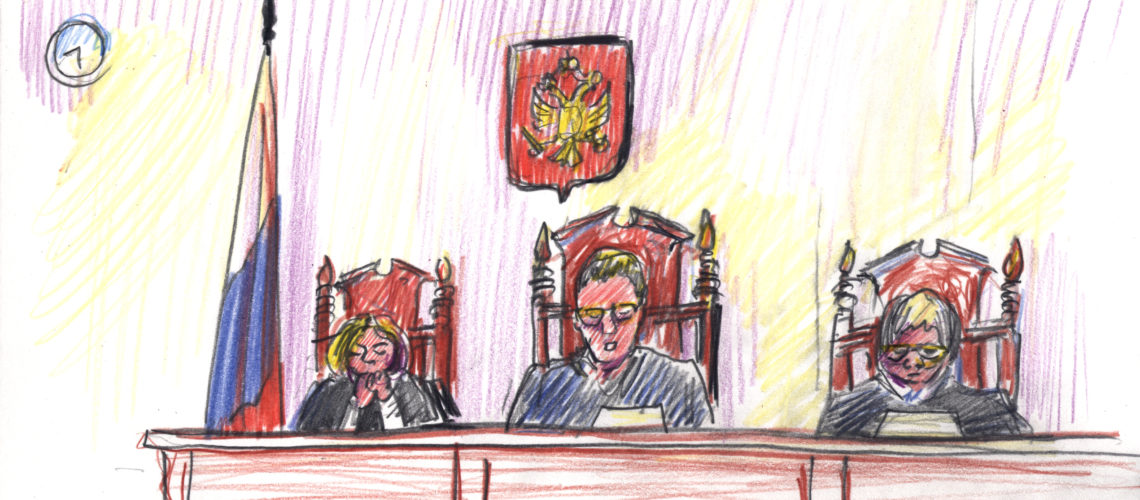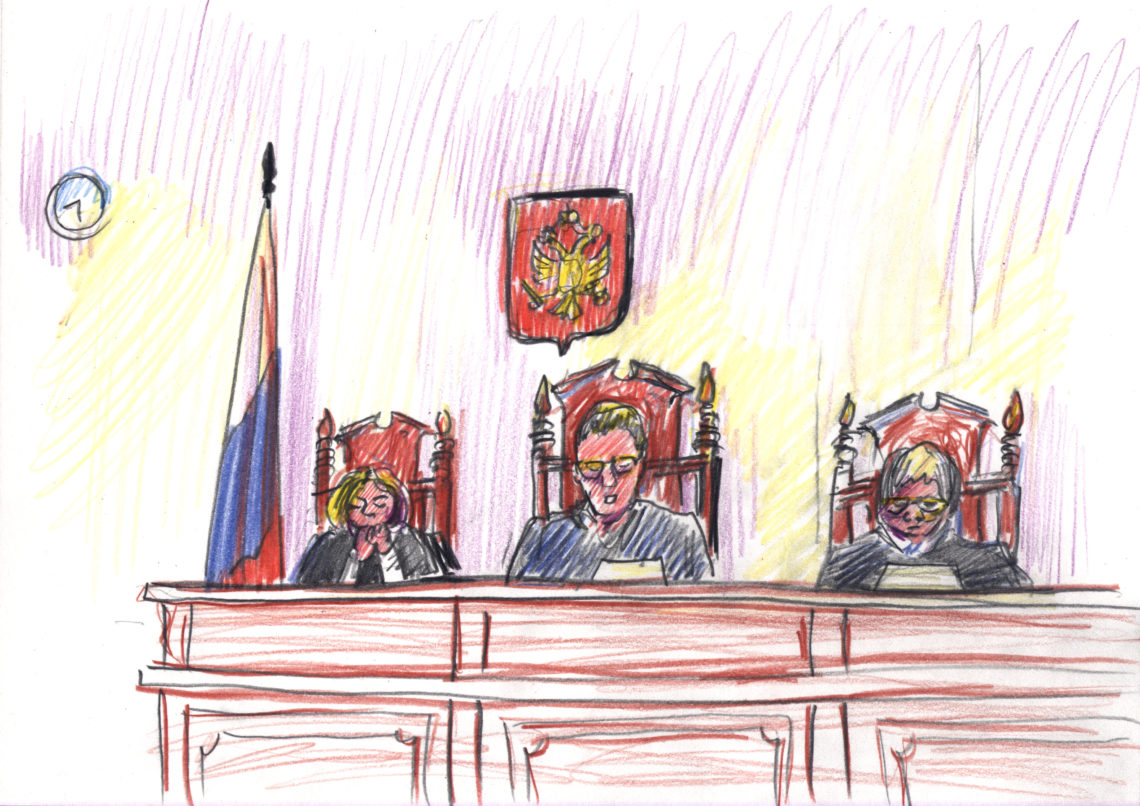

The case is being heard by the Kuibyshev District Court, St. Petersburg. The first hearing took place on 29 March.
Administrative plaintiff: Main Department of the Ministry of Justice of the Russian Federation in St. Petersburg.
Defendant: Charitable Foundation for Social and Legal Assistance Sphere.
At the entrance to the courthouse, I haven’t encountered any obstacles. The bailiff only asked me to open my backpack, he did not examine my belongings in detail.
Half an hour after the appointed time, the secretary invited everyone into the courtroom. There were representatives of the media. The secretary asked for the passports to be handed over – in response, I clarified whether the request applied to the public. The judge replied that there was no need to collect documents from the public, but only asked if we would be testifying as witnesses.
– Maybe we should write down the names just in case? – The secretary didn’t back down.
– If you need surnames, you need passports. I’m not going to ask them, – replied the judge.
The representative of the Ministry of Justice explained the plaintiff’s position: an unscheduled inspection was carried out on the basis of a citizen’s complaint. The activity of the charity organization is carried out with gross violations.
The representative of the plaintiff lists the laws regarding charitable organizations, what documents the organization should have, what it should do, what goals it should pursue, etc.
According to Sphere’s website, the organization promotes equal rights and respect for human dignity, regardless of sexual orientation or gender identity, by supporting initiatives and providing services to LGBT people and their families. The organization is primarily aimed at citizens who identify themselves as LGBT and their family members, the charity program also includes persons who have suffered crimes of discrimination based on homophobic or transphobic hatred, and Sphere acts as a partner for other organizations with similar goals, such as the Russian LGBT Network.
The representative of the administrative plaintiff emphasized that more than 95% of the financial resources managed by “Sphere” comes from foreign sources. All the actual activities of the organization are aimed at supporting the LGBT movement in Russia, forming socio-political views and beliefs, including conducting opinion polls, engaging citizens, including minors, as well as financing these activities with the aim of changing the legislation of the Russian Federation “regarding the activities of the LGBT movement”. This is confirmed by screenshots, donation agreements, donor contracts, and foreign funding.
The representative of the Ministry of Justice concludes that the articles of the CoAO RF (Code of Administrative Offense of Russia) [note: although the process is being considered under the Administrative Procedure Code of Russia], as well as all Russian legislation, are aimed at protecting such values as family and childhood, the institution of marriage as a union of a man and a woman; at preventing harm to the health of minors, their moral and spiritual development, and does not imply interference in the sphere of individual autonomy, including the sexual self-determination of the individual, does not prevent an impartial public discussion of the legal status of sex workers, and does not interfere with the legal status of LGBT persons.
Sphere’s violations [which we had time to record at the hearing]:
The plaintiff requests to liquidate the BF “Sphere”.
Representatives of the defendant asked a number of questions to the plaintiff – the representative of the Ministry of Justice did not answer in substance for a long time. For example, the representatives of “Sphere” asked to clarify which articles of the Constitution do not correspond to the activities of the foundation:
– The organization’s activity as a charitable organization does not correspond to the purposes stated in the charter,” the plaintiff’s representative repeated.
– Honourable Court, well, it’s… it’s… – the representative of “Sphere” waved her hands. — Well, the lawsuit says in plain text: “Does not comply with the articles”. I ask you to answer a rather simple question, which articles do not correspond to? There are many of them — 120-130 with something.
– Can you be more specific? – The judge asked the representative of the Ministry of Justice. – What articles of the Constitution are there violations of?
– The point is that this foundation is a charitable organization, and accordingly, the purposes of establishing a charitable organization are listed in the law on charity, says the representative of the administrative plaintiff.
– You don’t hear me, I’m asking about the Constitution, intervenes the representative of the defendant. – Why are you delving into some charity law? That will be the next question.
The woman starts looking for something in the lawsuit.
– ‘On page five,’ the defendant representative prompts.
– ‘Violates constitutional foundations…’
– Okay, what are they?
– What was the basis, what articles of the Constitution? – the judge asks again.
– Paragraph “g” of Part 1 of Article 72 of the Constitution of the Russian Federation, – finds the representative of the Ministry of Justice.
– What does it say?
– Concretized union… In the jurisdiction of the Russian Federation, the subjects of the Russian Federation are the issues of protection of the family, maternity, paternity, and protection of the institution of marriage as a union of a man and a woman, creating conditions for the dignity of the whole family.
– Mm-hmm, is that all? This is the only thing that the organization’s activities do not correspond to, do I understand correctly?
The representative of the Ministry of Justice hesitates for a moment, but then answers in the affirmative.
<…>
The defendant’s representatives asked to qualify the violations listed by the plaintiff. In the lawsuit it is claimed that there have been repeated, serious and irreparable violations. For example, the absence of a board of trustees is considered irreparable.
– So it is impossible to create a board of trustees? – clarifies the representative of the administrative defendant.
– Well, it didn’t exist during the inspection, – the representative of the Ministry of Justice calmly replies.
– No, unrecoverable means that we can’t fix anything, – explains the representative of the defendant. – So you’re saying that it’s impossible to create …
– And how do you want to go backwards? The organization has been operating without a board of trustees for a sufficient period of time, and you somehow want to fix it by going back in time? – objected the plaintiff’s representative. She also talks about the involvement of minors, citing as an example a book published by Sphere. The publication is labeled “18+” and, according to the defendant’s representative, the LGBT connection is not obvious without context, but the plaintiff’s representative does not take these arguments seriously.
– “18+. This is a children’s book that can only be bought and printed by adults. We are obligated to put the disclaimer because of the propaganda law”. – Quotes a representative of the plaintiff. – This is the form in which the “18+” was put.
After a break in the hearing, the lawyer Vitaly Isakov announces the position of the defendant.
He refers to Article 13 of the Constitution, according to which no ideology can be established as mandatory or state ideology. The argument that the organization has committed a violation as carrying out activities contrary to the principles of the concept of state policy, traditional family values, cannot be considered as violating any norms of law.
The organization, from the constitutional point of view, is the implementation of the right of citizens to associate. Article 28 of the Constitution guarantees the freedom to act in accordance with one’s convictions. “The state cannot allow or forbid an organization to carry out its policy – that is why “Sphere” is an NGO”.
No law on charitable activities and the law on NGOs says that NGOs are obliged to comply with the state ideology or state policy.
The lawyer separately addresses the plaintiff’s argument that the organization’s activities are limited. In other words, it does less than it says it does, which, according to the plaintiff, constitutes a violation.
– To liquidate “Sphere” on the grounds that it provides support only to such a socially unprotected category as representatives of the LGBT community means that it is possible to liquidate “Nochlezhka” because it provides assistance only to the homeless, – the lawyer objects. — By the same logic it is possible to liquidate all sorts of funds to help sick children, because they do not treat not all diseases, but only some. In general, the organization is offered incomprehensible obligations – to provide all social support. That is, the Ministry of Justice is being deceitful here and interprets the obligations broadly for the specified purposes.
<…>
– Suddenly the Ministry of Justice comes and says: “Well, according to us, Sphere doesn’t comply with public policy and needs to be liquidated”. It’s simple – you just need to liquidate the organization, according to the Ministry of Justice. Because it’s a non-governmental organization, it’s bad, it doesn’t fit the Ministry of Justice’s point of view, and the Ministry of Justice has the means to do so. After the liquidation of the organization, people who belong to the LGBT community will find themselves without support, and there is no organization that will take over this function.
Isakov notes that in the Oktyabrsky District Court, there is currently a dispute over the inspection report of the “Sphere” charitable foundation.
Vyacheslav Samonov, the second representative of the administrative defendant, takes the stand. He says that the only violation of the Constitution of the Russian Federation the Ministry of Justice cites is the violation of subparagraph “g” of paragraph 1 of Article 72, which establishes the subjects of jurisdiction of the Russian Federation and the regions [note: Article 72 of the Constitution specifies what the Russian Federation can do at the federal level, and what a constituent entity of the Russian Federation can do at its own level]. “Sphere” could not violate this clause, as the organization cannot violate the subjects of jurisdiction that are enshrined in the Constitution. No arguments as to why significant state values are violated have been translated by the Ministry of Justice, Samonov claims.
All the listed violations are repairable, and liquidation is a measure of last resort, concludes the representative of BF “Sphere”.
As a result, the judge postponed the hearing until 21 April 2022, so that the Oktyabrsky District Court could rule on the challenge of the act of the Ministry of Justice’s inspection of CF “Sphere”.
© 2019-2021 Independent public portal on impartial trial monitoring
